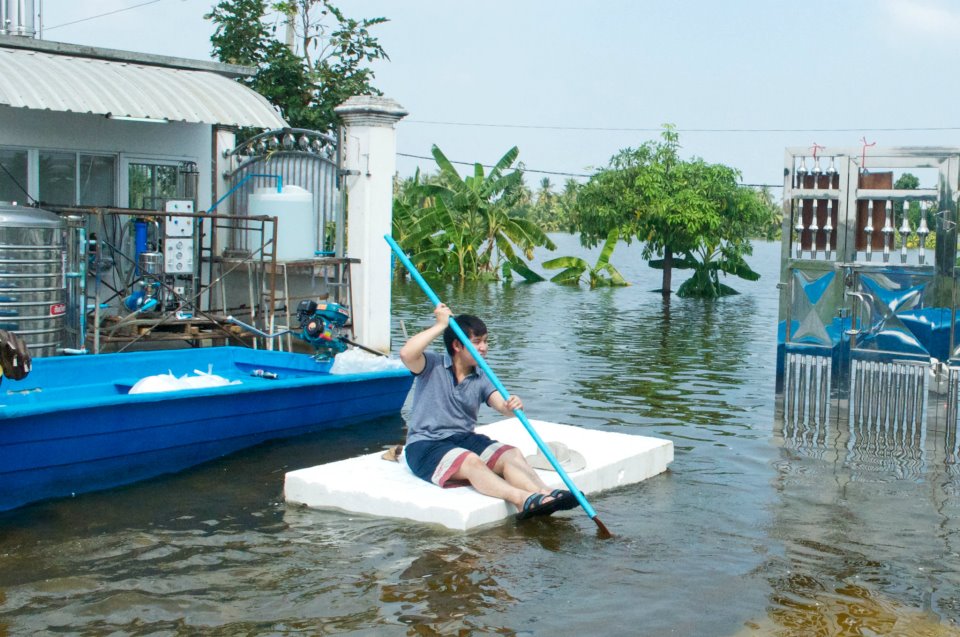On Monday, we launched a new series of posts highlighting current King’s Water students and researchers. MSc scholar Olivia Pang was first up; today, we introduce doctoral researcher Kay Phanthuwongpakdee.
Nuttavikhom (Kay) Phanthuwongpakdee loves traveling and trying new things. He has lived in many countries including his native Thailand as well as Singapore, the United States, and the United Kingdom. Academically, Kay initially trained as a chemist and an environmental engineer, earning an MSc in Water and Environmental Management from the University of Bristol after his BA in Geography and BS in Chemistry from the University of Washington in Seattle. Kay has previously worked as an environmental engineer in a Bangkok-based water filtration company.
Kay’s current research in sustainable development, social adaptations to disaster, and resilience to climate change originated from personal experience encountering floods and inequalities in his home country. Those experiences led to the harsh realization that science alone cannot solve everything. As a result, he’s now a hard-core convert to geography. Kay recently defended his thesis on “Living with floods: Moving towards resilient local-level adaptation in Central Thailand”.
Through his research at King’s Water and the bifocal-conceptual lens of political ecology and pragmatism, Kay’s thesis aims at capturing qualitatively the complexity of flood hazard and the expansion of the range of adaptation choice in Thailand. By investigating the perception of risk and the processes of adaptation within the local Thai context, it presents findings from fieldwork conducted in three communities (suburban, desakota and rural) in Central Thailand. This research helps define pathways to an expanded range of choice for flood management in Thailand.
Empirical data suggest that although the residents and local officials view flooding as an unwelcome normal occurrence, changes in people’s lifestyles to flourish in a modern society have altered how they perceived flooding. Depending on the areas, elements such as political conflicts and climate change have, in addition, weakened local flood response mechanisms. In its attempts to deal effectively with flooding, even after the 2011 Mega-Flood, the government has for too long already been inclined towards resorting to technological fixes and has been favouring policies meant to generate wealth for offsetting losses. Larger social, economic, political, historical, and cultural aspects have mostly been ignored. Participants, however, incorporate these elements into their answers and tend to perceive a wide array of choices. These findings suggest that amid the changing landscape, the locals are not passive. They have been using numerous strategies to help them adapt to flood events. However, several socio-cultural factors hinder them from expressing their views and force them to adopt limited strategies.
To facilitate adaptation, the Thai State needs to understand the material and discursive elements that shape local flood experiences. This can only be done through public engagement. Indeed, by talking to the participants, it became apparent that in order to expand the range of adaptation choices and strengthen local resilience, it is important to (i) encourage preparedness and risk awareness; (ii) promote traditional knowledge; (iii) highlight the role of religion; and (iv) strengthen the role of local government.
Kay participated in King’s College London’s Joint Phd Programme with the National University of Singapore, splitting time and supervision support between the two universities. The opportunity for this partnership, combined with the reputation of our geographical research on water, is what drew Kay to King’s College London. At King’s, Kay worked with King’s Water member Dr Daanish Mustafa. Associate Professor Victor Savage oversaw Kay’s work with the National University of Singapore.
In London, Kay enjoys working as a researcher with the Yangon Urban Growth Analytics project at LSE Cities, being mistaken for a first year student when he enters a room to teach, and looking over the Thames River from his office on the Strand. “From that office, I saw Queen Elizabeth II, the 2012 London Olympics Marathon and Paralympic events, several firework shows, and countless parades and rainbows.”
As with Olivia, our final question to Kay asked for three words that come to his mind when he hears “water”. They are:
Water=H2O
Life
Water Festival!
For more about research opportunities with King’s Water, check out our website. To keep up to date, follow us on Twitter!
